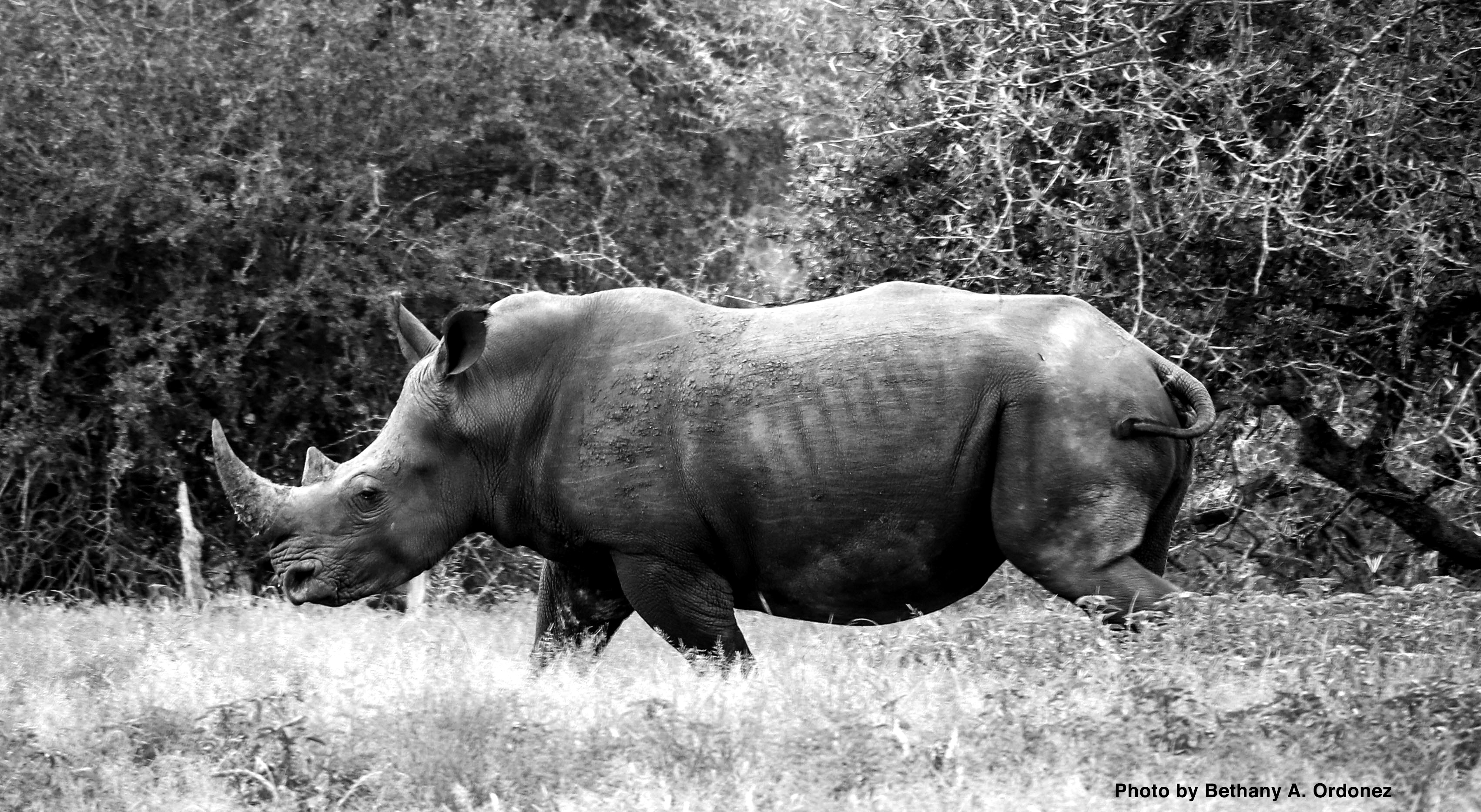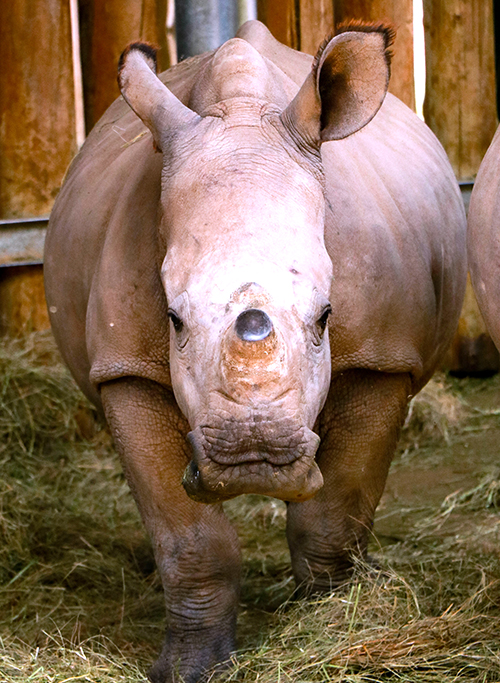More Valuable Than Gold: The War for Rhino Horn Takes an Uglier Turn

Earth provides enough to satisfy every man’s needs, but not every man’s greed. ~ Mahatma Gandhi
Last February, the reality of the war on rhinoceros took an uglier turn when five gunmen stormed the Fundimvelo Thula Thula Rhino Orphanage in KwaZulu Natal, South Africa. Until then, this war, waged for the prize of rhino horn, a commodity worth far more than gold, had been targeted at the rhinos only. Rangers had faced increasing threats, but they endured no physical harm, left mainly to pick up the pieces — heal mutilated rhinos and rear orphaned young. That changed on February 20 when the attack turned on the human caregivers as well.
The orphanage, located in the exclusive private Thula Thula game reserve in Zululand, housed orphaned rhinos along with their guard dog, care-givers and some international volunteers. Many of these young rhino had faced horrific starts to life, witnessing the murder and mutilation of their mothers by poachers, and left to fend for themselves in the unforgiving wilderness of South Africa.
Rhino horn is worth more than its weight in gold, and rhino poachers are ruthless. In 2014, rhino horn sold for $60,000 per kilogram. In comparison, today a kilogram of gold sells for just over $40,000. The syndicates that run the poaching operations are huge, and reach the highest echelons of society in some countries, making them very hard to take down.

Young rhino with horn removed. Location withheld. Photo by Bethany A. Ordonez.
The orphanage was founded out of a need for a safe place where these young could be reared and released back into the wild. It was run by the Lawrence Anthony Earth Organization, a world-renowned conservation organization. Created by Lawrence Anthony himself after realizing the incredible dedication and resources it takes to rehabilitate orphaned rhinos, the orphanage began operations in 2015. Just weeks before the attack, three rhino had been successfully re-introduced to the wild in iSimangaliso Wetland Park, a world heritage site. Daily operations were managed by Karen Trendler, a wildlife rehabilitation specialist with over 25 years of experience.
The evening of February 20, five gunmen gained entry to the orphanage, despite the complex security features in place. They proceeded to tie and assault the caregivers, holding them hostage for several hours. Speaking in an interview with journalist Bonné de Bod via Facebook Live, Karen said, “We were led to believe…they are coming for the rhino so if the people stay out of the way, if the people comply, and you don’t interfere, they are there for the horn and they will leave the people alone.”
This, however, was not the case. The attackers not only assaulted the caregivers, but it was reported in numerous outlets that one of the international volunteers was sexually molested during the raid. The poachers also shot two of the young rhino that were housed in the orphanage and removed their horns. One of the youngsters, Gugu, died instantly from the gunshot wound, however the other young rhino survived the gunshot, and was alive during the entire, horrific ordeal as his horn was hacked from his face. He was euthanized the next morning by a vet when it was determined that his injuries were too severe for him to survive.
Karen recounted this young rhino’s tragic short story during the live interview:
Impi came to us having survived a particularly brutal poaching, he stayed at his mother’s carcass for 6 days, moving away just a short distance to eat mud because he was obviously very hungry and very thirsty; and when he came in I still remember so clearly sitting with this tiny little rhino that was covered in blood spatter from where they had shot the mom and he smelt terribly of carcass fluids; in my mind saying to him, you’re safe now, we will never let that happen to you again, you’re never going to have to go through that again.
Sadly, they could not keep that promise.
Having already witnessed his mother’s murder, and the utter brutality of his mother being dehorned by poachers, young Impi was subject to the same, horrifying fate just a few months later.
During the live interview, and in recent Facebook posts, Karen has implied that the attack may have been an inside job, given the attackers were able to bypass all the security features. They knew the location of the cameras and the schedule of the staff, and knew that these two young rhino were a week away from having their horns surgically removed – a precautionary measure to make the rhinos worthless to poachers — and being re-introduced to the wild.
Police are still investigating and while it was reported that two men were arrested near Ermelo in Mpumulanga province, there have been no further breakthroughs. Karen took to Facebook to ask the public for patience and sensitivity as the police continue to investigate the attack: “It is not until you have been in the middle of all this, that you even begin to realize the complexity of the process…”
The brutality of the attack left many around the world shocked. “It’s so concerning, is this another stage?” asked Karen. “It looks like this is something that has been escalating that… people who are around the rhino are increasingly becoming the target.” Many question if such carnage is now to be expected in the fight to save a species. When asked if the events of February 20 would spell the end of the rhino orphanage, Karen responded, “No, we can’t afford to have it as the end. There is a need for the orphanage specifically in this area, the fact that we have handled a number of very difficult cases in a very short period of time, the poaching crisis is nowhere near over.”
On May 1, 2017, Thula Thula Rhino Orphanage announced it would close, due to the continuing security threats. The directors of the Lawrence Anthony Earth Organisation issued this statement:
Ongoing security challenges experienced since the attack and the review of the independent security assessments have resulted in the LAEO Board of Directors making the heart wrenching decision to permanently close the Fundimvelo Thula Thula Rhino Orphanage. The security assessments highlighted critical issues that LAEO management felt could not be mitigated and these factors would have directly compromised the ongoing safety of everyone on-site.
All rhinos being cared for at the orphanage were relocated to other sanctuaries. On May 26, 2017, Thula Thula Rhino Orphanage reopened as a wildlife rehabilitation center that will focus on injured wildlife from the area.

This is so sad and heart wrenching. Thank you for sharing and highlighting the need for continued protection of our wild life.
I am a little confused about the removal of rhino horns to protect the rhinos. Don’t they need them Isn’t there a danger in removing them? Is the objection to horns being forcibly removed because if it is, why not sell the ones that are removed for protection reasons?
Rhino’s do not necessarily need their horns for survival, however that does not mean they do not use their horns at all. Horns are used in territorial defense, foraging and in rearing young (either through defending the young or through using the horn to guide the young). Removal of horns has not been shown to be 100% effective, and we have to consider the inherent danger in the actual process of removing the horns as well. Anesthetizing any animal has risks to the welfare of the animal and is also quite traumatic for the animal.
Even with the horn removed, poachers will, and have killed rhinos for the stub because even that small piece of horn is incredibly valuable.
Until recently, trade in rhino horn was banned in South Africa, but a number of ranchers challenged this ban in court as they wanted to sell their stockpile of horns. On April 5, 2017, the high court legalized the domestic trade in rhino horn in South Africa. Proponents of this trade believe that the sale of their horns will bring in much needed funds to protect the rhino. Opponents believe that it will be difficult to distinguish which horns have been removed legally through dehorning, and which horns are from poached animals.
Unfortunately there is no simple answer to the question of whether or not to dehorn rhinos, but at this time, conservationists are willing to try whatever they can to protect the species.
This is shocking. Are there wildlife conservation laws to protect rhinos in South Africa, If so, are they enforced?
Hi Paul,
Yes, there are absolutely laws in South Africa that deal with rhino poaching and they are enforced.
The National Environmental Management Biodiversity Act (NEMBA) is the legislation in South Africa that protects species and ecosystems that warrant national protection. Section 56 allows the government to publish a list of endangered and vulnerable species and Section 57 deals with the protection of these species. Rhino’s in South Africa are listed as endangered and so, are protected under Section 57.
NEMBA goes on in Sections 101 and 102 to list what constitutes a criminal offence under the act, and what the resulting penalties shall be:
(1) A person convicted of an offence in terms of section 101 is liable to a fine not exceedingR10 million, or an imprisonment for a period not exceeding ten years, or to both such a fine and such imprisonment.
(2) If a person is convicted of an offence involving a specimen of a listed or threatened species, a fine may be determined, either in terms of subsection (1) or equal to three times the commercial value of the specimen in respect of which the offence was committed, whichever is the greatest
Rhino conservation in South Africa is a hot topic and is a cause for national concern. The laws are enforced to the extent possible, however there are a number of issues at play:
1. Many poachers enter South Africa from Mozambique and once they cross the border back into Mozambique it is difficult to track them down and apprehend them, even with agreements in place between the governments of South Africa and Mozambique
2. The individuals and organizations funding the surge in rhino poaching are not based in South Africa, and so to track them down and prosecute them is near impossible.
While many poachers are caught and prosecuted, and some even killed in shootouts with the rangers, we have to look at this as we would look at an organization that traffics drugs. Arresting a dealer on the street does not prevent another dealer from taking their place. It is the kingpin that needs to be taken down in order for the organization to collapse. Unfortunately, there does not seem to be much hope in stopping the trade solely through enforcement of the laws. The most effective way to fight this is through education. Rhino horn is sold in many Asian countries for medicinal use. Education of people in those countries is probably the only way to lessen the demand for the horn. If people realize that rhino horn is made up of keratin, the same substance that makes up fingernails, they might begin to realize that using it to cure disease is as fruitless as chewing your nails and hoping for the same result.
An excellent and informative article.